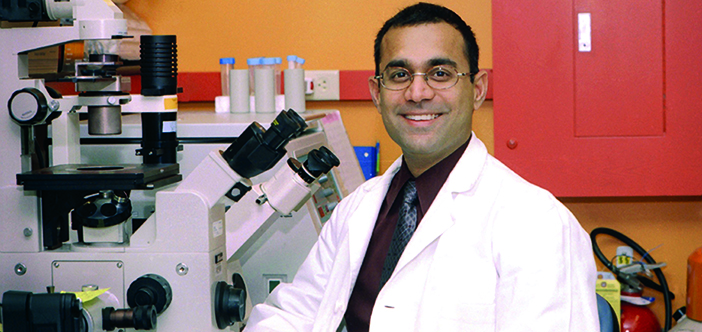An MD-PhD is part of a new era of cancer breakthroughs.
Alpert Medical School can brag of many remarkable students and alumni in its short history, but Raghu Kalluri, PhD MD’09 was certainly the first to be a full professor at Harvard Medical School while simultaneously studying medicine at Brown.
Born in St. Louis, Kalluri grew up in India and received his undergraduate degree there. After earning his PhD in biochemistry and molecular biology at the University of Kansas Medical Center and completing a postdoctoral fellowship at the University of Pennsylvania School of Medicine, where he did research on immunology and organ fibrosis, he became an assistant professor of medicine at Harvard Medical School and Beth Israel Deaconess Medical Center in 1997.
He had long considered the idea of going for a medical degree, but Kalluri continued his teaching and research at Harvard, building a lab focused on matrix biology and cancer biology. “The idea of pursuing the unknown was more important to me,” he says. At that point, he had already given hundreds of lectures around the world.
But a few years later, Kalluri, at 35, felt it was time to tackle the MD: “There was a knowledge gap I knew I should close. I had a personal desire to learn more.” He felt the degree would make him more useful as a researcher; besides, “I was never afraid to be a student.”
Kalluri confronted unusual challenges in finding a medical school. At Harvard he already was teaching its medical students, and so it was not an option. He needed to stay close to Boston because he planned to keep running his lab of more than 30 people. But some other Boston schools weren’t the right fit. Then a colleague suggested his alma mater, Alpert Medical School. Kalluri found the deans and the School receptive to him. He went through the exact same admissions process as everyone else, and was admitted to the MD Class of 2009.
“It was a humbling experience,” Kalluri says. He went from being “a master of my universe” in his lab to being one of a class full of remarkably smart students. “I learned to say ‘I don’t know’ with great pride and respect,” he says.
After graduating Kalluri continued his work at Harvard. But then came along an “amazing opportunity”: he was recruited to the MD Anderson Cancer Center as professor and chairman of the Department of Cancer Biology. In 2012, he joined the highly regarded hospital that is a key part of Texas’s aggressive, multibillion-dollar effort to fight cancer.
Kalluri, who continues to speak internationally, is full of enthusiasm and optimism. “This is the golden age of understanding cancer,” he says. “This is an extremely exciting time.” His research involves studying the environment of cancer cells, where he says great advances are being made. Recently he and his colleagues reported in Nature their findings that describe how pancreatic cancer could be diagnosed earlier. “We think in this decade we will have a lot more advances” as the cancer field reaps the benefits of many years of basic research, he says.
While he has moved farther from Providence geographically, Alpert Medical School remains close to Kalluri. “I am extremely grateful for the opportunity Brown gave me,” he says. “It made me a better human being.”




